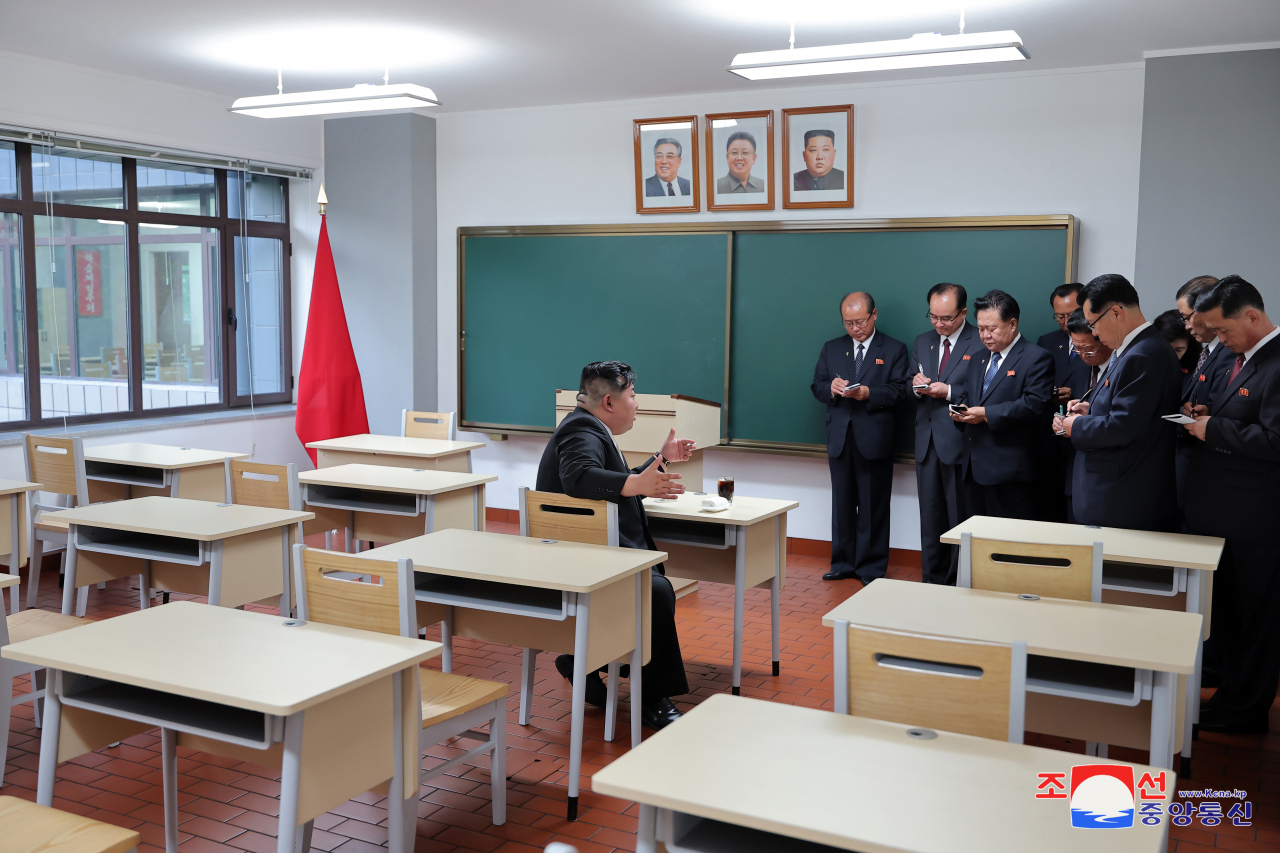
The portrait of North Korean leader Kim Jong-un was publicly displayed along with those of his father and grandfather for the first time, sparking speculation about the message it sends.
Portraits of leaders are at the core of North Korea’s state-sponsored cult of personality that has buttressed the Kim family’s rule since the country’s foundation in 1948. Almost all homes and public offices in North Korea must have portraits of Kim’s father Kim Jong-il and grandfather Kim Il-sung, but featuring that of the younger Kim hadn’t yet been a requirement until recently.
Here's a look at what it means and why now:
On Wednesday, North Korea’s state media released a photo showing Kim Jong-un’s large portrait hung on the wall of a building alongside those of Kim Jong-il and Kim Il-sung, during his recent visit to the Central Cadres Training School of the ruling Workers’ Party.
Another state media photo showed the smaller portraits of the three Kims placed side by side at a classroom, where Kim Jong-un, seated in a chair, talked to officials who took notes of his remarks.
Longtime North Korea watchers say it’s the first time for North Korea to publicize images showing the portrait of Kim Jong-un installed together with those of the two late North Korean rulers since the younger Kim took power in late 2011.
Placing his portrait next to those of his father and grandfather would suggest he wants to elevate his status to a level similar to that of the past two leaders, who are the subject of a strong and loyal following and regarded like gods. By doing so, Kim Jong-un wants to announce the start of his own era, according to Kwak Gil-sup, head of One Korea Center, a website specializing in North Korea affairs.
Few foreign experts question Kim’s grip on power. But the 40-year-old has still avoided the same level of personality cult bestowed on his predecessors: they are memorialized in numerous statues and mosaics across North Korea, their birthdays are two of the country’s biggest holidays and pins bearing their likenesses are worn by all North Korean adults.
Kwak said Kim Jong-un’s portrait will now likely be hung on the walls of all households while his birthday could also be designated as an official holiday.
The place where his portrait was recently hung is the highest education facility for ruling party brass. Kwak said it shows that “Kim Jong-un wants to begin a new era with new people.”
Observers say Kim needs stronger domestic support of his leadership as he struggles to navigate his country past economic hardships and protracted tensions with the United States over his nuclear program. In January, Kim announced he will no longer pursue a peaceful unification with South Korea, a decadeslong policy cherished by his father and grandfather.
Prospects for Kim's push aren't clear, though he likely thinks he has bolstered his power and built his nuclear and other military programs strong enough to elevate himself in the national mythology.
Kim's headlong pursuit of a bigger nuclear arsenal has drawn punishing US-led sanctions, which together with border closures during the pandemic were believed to have badly hurt the North’s fragile economy. Kim has subsequently admitted policy failures as his vow that North Koreans would “never have to tighten their belts again” remained unfulfilled.
“For regime propaganda to reach such a stage of personality cult suggests both impressive confidence and insecurity,” said Leif-Eric Easley, professor of international studies at Ewha Womans University in Seoul.
“However, this is also a political gamble, with Kim betting that ideology can buy time to address North Korea’s economic struggles and social divisions," Easley said.
Cheong Seong-chang, an analyst at the private Sejong Institute in South Korea, said Kim's portrait is more likely associated with his possible bid to groom his preteen daughter, reportedly named Kim Ju-ae, as his heir.
“By hanging the portraits of all three -- Kim Il-sung, Kim Jong-il and Kim Il-sung -- I assess that North Korea is underscoring the need to extend the Paektu bloodline to justify another hereditary power transfer for Ju-ae,” Cheong said, referring to the Kim family’s lineage named after the country’s most sacred mountain.
Ju-ae, aged about 10, has been the subject of keen outside attention as she accompanied her father on a series of high-profile events such as missile tests and military parades since late 2022. State media called her Kim Jong-un’s “most beloved” or “respected” child while churning out footage and photos proving her soaring political standing and closeness with her father.
In January, South Korea's spy agency said it saw Ju-ae as her father’s likely heir apparent.
Some experts say it's still too premature to determine Ju-ae is Kim's heir, given her age and North Korea's male-dominated power hierarchy.





